What is a subject complement? Don’t you adore it when you find the perfect scarf or necklace to complete your look? What if you went to dinner, enjoyed a delicious meal, and then ordered a dessert that completely elevated the experience? When things like that happen, isn’t it wonderful? The jewelry or scarf has enhanced the attire, and the dessert has enhanced the meal.
A complement completes or ends something else; it improves it. Looking closely at the term complement, you might be reminded of the word “complete.” Similar to how a dessert may improve a meal and an accessory can improve an outfit, a subject complement provides details that make the sentence more complete.
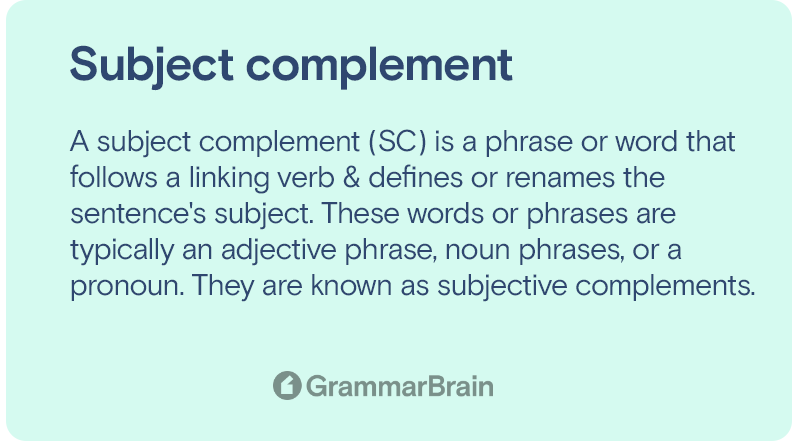
What is a subject complement?
A subject complement (SC) is a phrase or word that follows a linking verb & defines or renames the sentence’s subject. These words or phrases are typically an adjective phrase, noun phrases, or a pronoun. They are known as subjective complements.
In conventional grammar, a predicate nominative or predicate adjective is typically used to identify a subject complement.
| Element: | Example: |
| Adjectives | The teacher is disappointed. |
| Pronouns | The teacher is she. |
| Noun phrases | The teacher is an interesting woman. |
| Prepositional phrases | The teacher is in the classroom. |
| Noun clauses | The teacher is who taught you last year. |
Subject Complement (SC) Grammar Rules
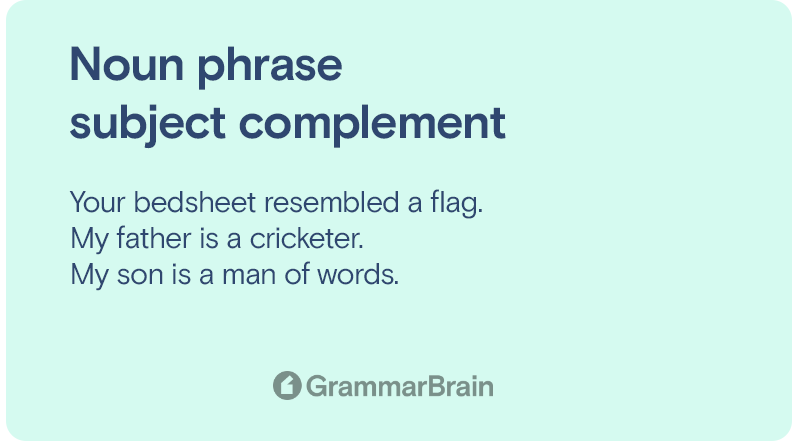
Noun phrase subject complement
In a clause or sentence, a noun phrase fulfills the function of the subject complement. Noun/pronoun phrases are sentences that include a noun or pronoun together with any additional modifiers, determinants, or complements.
Example:
- Your bed sheet resembled a flag.
- My father is a cricketer.
- My son is a man of words.
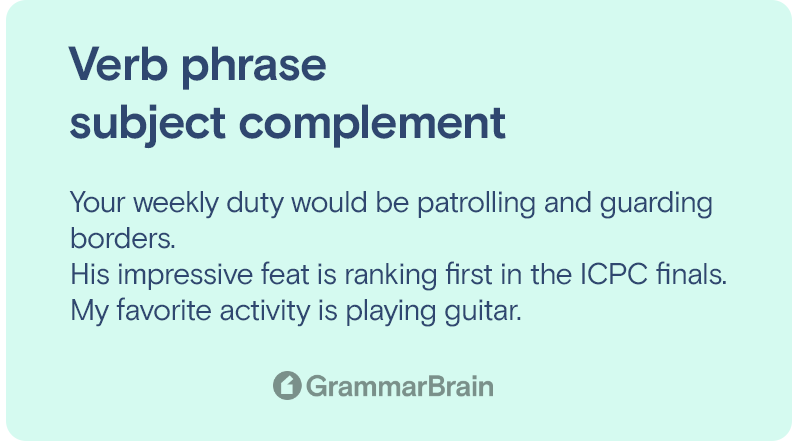
Verb phrases subject complement
Another grammatical structure that fulfills the grammatical function of the subject complement is a verb phrase. Present participle and infinitive forms are used to represent the verb phrase. Verb phrases include a verb, a compliment, a modifier, an infinitive marker, etc.
Example:
- Your weekly duty would be patrolling and guarding borders.
- His impressive feat is ranking first in the ICPC finals.
- My favorite activity is playing guitar.
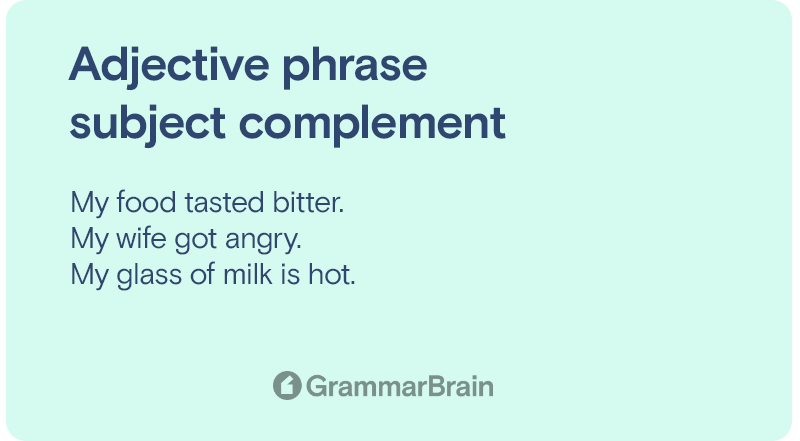
Adjective phrases subject complement
The adjective phrase is the other grammatical structure that fulfills the grammatical function of the subject complement. Adjective, modifier, or complement-containing phrases are known as adjectival phrases.
Example:
- My food tasted bitter.
- My wife got angry.
- My glass of milk is hot.
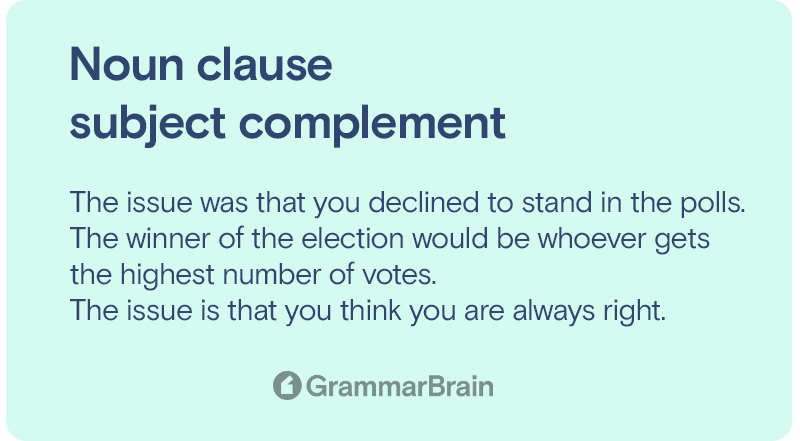
Noun clauses as subject complement
Another grammatical structure that fulfills the grammatical function of the subject complement is a noun clause. A clause preceded by a subordinating conjunction makes up a noun clause, referred to as a subordinate clause.
Example:
- The issue was that you declined to stand in the polls.
- The winner of the election would be whoever gets the highest number of votes.
- The issue is that you think you are always right.
- My question is whether you will stand up to the public for an explanation.
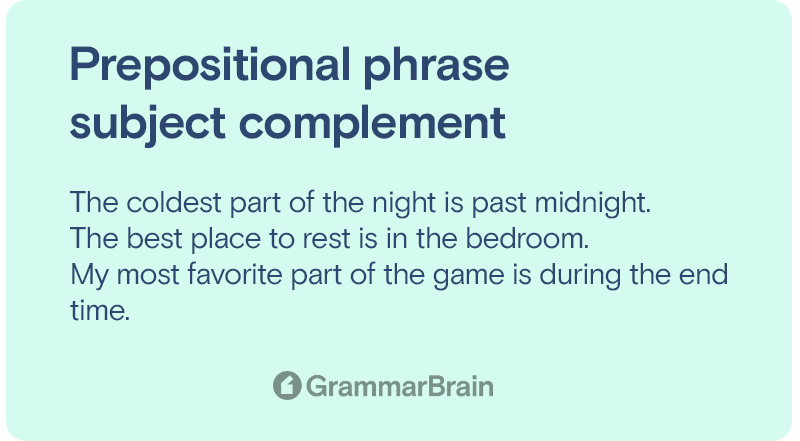
Prepositional phrases subject complement
This last grammatical form carries out the subject complement’s grammatical purpose. Prepositional phrases are made up of a preposition followed by a prepositional complement.
Example:
- The coldest part of the night is past midnight.
- The best place to rest is in the bedroom.
- My most favorite part of the game is during the end time.
Linking Verbs and Subject Complements
A verb is a linking verb if it needs a subject complement (SC) to complete the phrase. In the following examples, the subject complement usually identifies or describes the person or thing the subject denotes.
What does a subject complement do?
A subject supplement provides more details about the topic. It frequently follows linking verbs, sense verbs (be, seem, smell, and taste), and verbs denoting a change of state (including go, get, and become).
Examples of subject complement
Noun as a subject complement
Tom is a cat.
- “cat” is a noun
- “Cat” renames “Tom”
- “cat” follows the linking verb “is” (to be)
- “cat” is a subject complement
Adjectives as a subject complement
Tom is red.
- “red” is an adjective
- “red” describes “Tom”
- “red” follows the linking verb “is” (to be)
- “red” is a subject complement
FAQs
What are the types of subject complements?
Predicate nominatives & predicate adjectives are the two categories of subject complements. Subject complements that are nouns or pronouns are known as predicate nominatives.
Adjectives that complement the topic are known as predicate adjectives.
How can you determine a subject complement?
It is necessary to determine whether the verb in the clause or sentence is a linking verb before finding the subject complement.
The word that renames or describes the sentence’s subject might be used to identify the subject complement after the verb has been identified as linking.
What is a good example of a subject complement?
Here are two illustrations of complements for subjects. The emphasis has been placed on subject complements and linking verbs. An example is given below.
The cyclone was non-ending.
What is a subject complement?
The term “subject complement” describes the words, phrases, and clauses that follow the linking verb and elaborate on or change the subject of a sentence. Grammar-related elements called subject complements are found in the predicate of a sentence.
Additional types of grammatical elements can be employed as subject complements in English grammar, even though nouns and adjectives are the most frequently used subject complements.
How does a subject complement and predicate nominative work together?
They typically don’t. A predicate nominative will rename or re-identify the subject. Subject + Verb is a direct object.
Inside this article
Fact checked:
Content is rigorously reviewed by a team of qualified and experienced fact checkers. Fact checkers review articles for factual accuracy, relevance, and timeliness. Learn more.
Core lessons
Glossary
- Abstract Noun
- Accusative Case
- Anecdote
- Antonym
- Active Sentence
- Adverb
- Adjective
- Allegory
- Alliteration
- Adjective Clause
- Adjective Phrase
- Ampersand
- Anastrophe
- Adverbial Clause
- Appositive Phrase
- Clause
- Compound Adjective
- Complex Sentence
- Compound Words
- Compound Predicate
- Common Noun
- Comparative Adjective
- Comparative and Superlative
- Compound Noun
- Compound Subject
- Compound Sentence
- Copular Verb
- Collective Noun
- Colloquialism
- Conciseness
- Consonance
- Conditional
- Concrete Noun
- Conjunction
- Conjugation
- Conditional Sentence
- Comma Splice
- Correlative Conjunction
- Coordinating Conjunction
- Coordinate Adjective
- Cumulative Adjective
- Dative Case
- Determiner
- Declarative Sentence
- Declarative Statement
- Direct Object Pronoun
- Direct Object
- Diction
- Diphthong
- Dangling Modifier
- Demonstrative Pronoun
- Demonstrative Adjective
- Direct Characterization
- Definite Article
- Doublespeak
- False Dilemma Fallacy
- Future Perfect Progressive
- Future Simple
- Future Perfect Continuous
- Future Perfect
- First Conditional
- Irregular Adjective
- Irregular Verb
- Imperative Sentence
- Indefinite Article
- Intransitive Verb
- Introductory Phrase
- Indefinite Pronoun
- Indirect Characterization
- Interrogative Sentence
- Intensive Pronoun
- Inanimate Object
- Indefinite Tense
- Infinitive Phrase
- Interjection
- Intensifier
- Infinitive
- Indicative Mood
- Participle
- Parallelism
- Prepositional Phrase
- Past Simple Tense
- Past Continuous Tense
- Past Perfect Tense
- Past Progressive Tense
- Present Simple Tense
- Present Perfect Tense
- Personal Pronoun
- Personification
- Persuasive Writing
- Parallel Structure
- Phrasal Verb
- Predicate Adjective
- Predicate Nominative
- Phonetic Language
- Plural Noun
- Punctuation
- Punctuation Marks
- Preposition
- Preposition of Place
- Parts of Speech
- Possessive Adjective
- Possessive Determiner
- Possessive Case
- Possessive Noun
- Proper Adjective
- Proper Noun
- Present Participle
- Prefix
- Predicate



